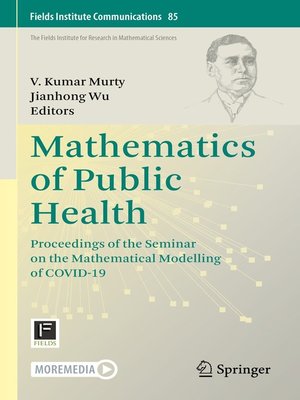Mathematics of Public Health
ebook ∣ Proceedings of the Seminar on the Mathematical Modelling of COVID-19 · Fields Institute Communications
By V. Kumar Murty

Sign up to save your library
With an OverDrive account, you can save your favorite libraries for at-a-glance information about availability. Find out more about OverDrive accounts.
Find this title in Libby, the library reading app by OverDrive.



Search for a digital library with this title
Title found at these libraries:
| Library Name | Distance |
|---|---|
| Loading... |
Curated by the Fields Institute for Research in Mathematical Sciences from their COVID-19 Math Modelling Seminars, this first in a series of volumes on the mathematics of public health allows readers to access the dominant ideas and techniques being used in this area, while indicating problems for further research. This work brings together experts in mathematical modelling from across Canada and the world, presenting the latest modelling methods as they relate to the COVID-19 pandemic.
A primary aim of this book is to make the content accessible so that researchers share the core methods that may be applied elsewhere. The mathematical theories and technologies in this book can be used to support decision makers on critical issues such as projecting outbreak trajectories, evaluating public health interventions for infection prevention and control, developing optimal strategies to return to a new normal, and designing vaccine candidates and informing mass immunization program.
Topical coverage includes: basic susceptible-exposed-infectious-recovered (SEIR) modelling framework modified and applied to COVID-19 disease transmission dynamics; nearcasting and forecasting for needs of critical medical resources including personal protective equipment (PPE); predicting COVID-19 mortality; evaluating effectiveness of convalescent plasma treatment and the logistic implementation challenges; estimating impact of delays in contact tracing; quantifying heterogeneity in contact mixing and its evaluation with social distancing; modelling point of care diagnostics of COVID-19; and understanding non-reporting and underestimation.







